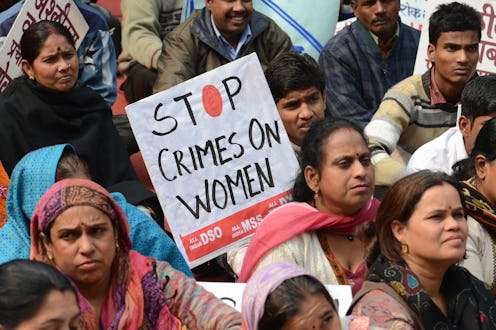News
This Rape Convict's Comments Are Sickening
The roots of sexism are deeply entrenched in many societies today, despite the progress that has been made thus far. Come International Women's Day on March 8, a BBC documentary set to air that day will truly be a blast from the disgustingly chauvinistic past, in which a convict of the 2012 Delhi gang rape blames the victim for the attack and her brutal murder.
The gang rape and murder of a 23-year-old medical student on a bus in Delhi set off an outpouring of grief and outrage not only across India, but also across continents where the international community, shocked at the brutality and inhumanity of the perpetrators, loudly denounced the horrific crime and the deep sexual injustices in the society.
In director Leslee Udwin's BBC documentary about the incident, India’s Daughter, Mukesh Singh, who assaulted the woman with a group of five other men, faulted the victim for the attack. In a series of appalling statements (reminiscent, perhaps, of a 15th century imbecile) defending what I assume was his dire lack of self-control, he said:
You can’t clap with one hand — it takes two hands. A decent girl won't roam around at 9 o'clock at night. A girl is far more responsible for rape than a boy. Boy and girl are not equal. Housework and housekeeping is for girls, not roaming in discos and bars at night doing wrong things, wearing wrong clothes. About 20 percent of girls are good.
An unrepentant Singh also faulted the victim for her death — which he called an "accident" — saying:
When being raped, she shouldn't fight back. She should just be silent and allow the rape. Then they'd have dropped her off after "doing her," and only hit the boy.
The attack's backlash in the nation and from overseas countries was swift and harsh, prompting the Indian government to enact stricter laws on sexual violence. In an effort to make an example of the perpetrators, Singh and three other men were convicted of the death penalty, which all have appealed. But Singh also voiced strong opinions on being sentenced to death row in the interview, managing to squeeze in a threat to women in the process:
The death penalty will make things even more dangerous for girls. Now, when men rape, they will not leave the girl like we did. They will kill her after that. Before, they would rape and say, "Leave her, she won't tell anyone." Now when they rape, especially the criminal types, they will just kill the girl. Death.
As justified as it is to direct one's fury at Singh — who clearly displays zero remorse over the incident — his remarks are indicative of the prevalent gender inequality and sexual violence in India. Indulekha Aravind wrote in an op-ed in the Business Standard that in spite of enraged responses to sexual harassment incidents in the country, there is also a vocal majority who pin the blame on women for such attacks, reflective of the victim-blaming culture — particularly focused on females — in India.
As the trial was happening in 2013, one of Singh's defense lawyers, AP Singh, came under fire for echoing such sentiments. He said, to widespread repugnance:
If my daughter or sister engaged in pre-marital activities and disgraced herself and allowed herself to lose face and character by doing such things, I would most certainly take this sort of sister or daughter to my farmhouse, and in front of my entire family, I would put petrol on her and set her alight.
In response to Singh's statements on Monday, the victim's father told The Wall Street Journal that they were "perverse and derogatory," adding:
I hope these devils are hanged soon and not housed safely in jail.
Image: Getty Images (2)
